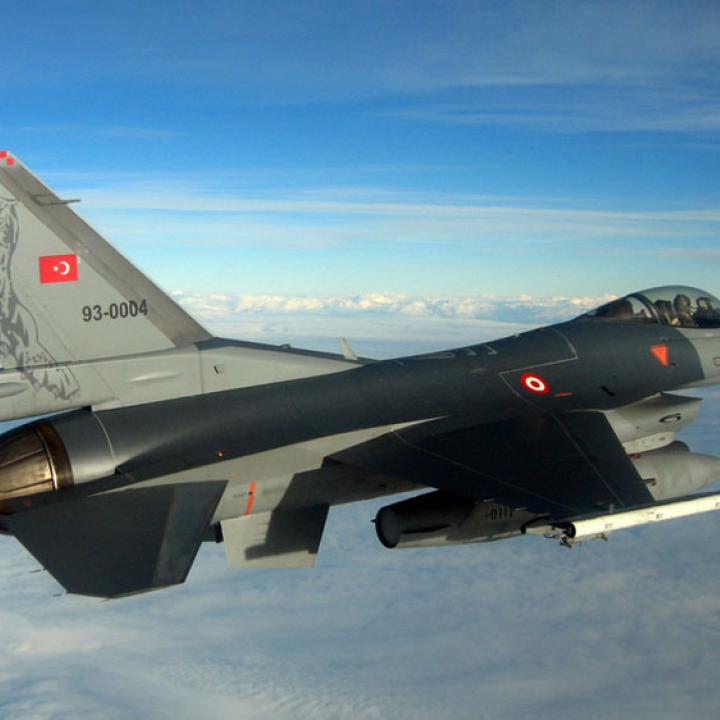
- Policy Analysis
- Articles & Op-Eds
Turkey's Istanbul Attack Vengeance Will Be Like 'Rain From Hell'

ISIS may be trying to sow domestic suspicion by not claiming responsibility for the airport attack, but the incident could still spur Turkey into full-scale war against the group.
The suicide bombing at Turkey's Ataturk Airport is a symbolic attack at the heart of Istanbul. If ISIS is indeed behind this attack, as the U.S. and Turkey say, this would be a declaration of war. Turkey's vengeance will come down like rain from hell. Thus far, Turkey has avoided engaging ISIS in full war, instead prioritizing its battle against Syria's Assad regime as well as blocking advances by the Syrian Kurds. For Turkey, fighting ISIS as a first order battle could now be unavoidable.
SYMBOLIC TARGET
In the past, ISIS has carried out attacks in Turkey, but this attack eclipses those in scale. Previously ISIS has targeted tourists; this time they're going for the heart of Turkey, and in a brazen attack that has claimed many more lives than previous ISIS attacks.
Istanbul's Ataturk Airport is the main entry point for the majority of the more than 30 million people who visit Turkey every year. It's also the hub of Turkish Airlines, the country's only known international brand and the gateway to doing business in Istanbul. This attack is going to hurt Turkey's tourism economy and the business community by seriously challenging the idea that Turkey is a safe place to visit and do business.
WHY IS ISIS TARGETING TURKEY?
If ISIS is the anomaly in Islam, Turkey is the norm in Islam. Turkey has a secular constitution. It's a democratic society where you have gender equality between men and women. It's a member of NATO and is in accession talks with the European Union. It's a friend of the West and the United States and only yesterday agreed to restore diplomatic ties with Israel.
The question was not if, but when ISIS would carry out an attack like this. For a while now, Turkey-backed rebels have been attacking the Islamic State inside Syria, together with U.S.-backed Kurds, so the attack could also be seen as retaliation by ISIS.
BUILD UP TO WAR
For a very long time, the relationship between ISIS and Turkey looked like a Cold War, with both sides avoiding fighting each other. For instance, when ISIS surrounded the Turkish exclave in Syria in 2014, it did not run that over. And similarly, Turkey avoided joining the U.S. to fight ISIS.
Then, the relationship evolved into what looked like limited warfare as Turkey came on board in 2015 to help the U.S. combat ISIS. At that time, ISIS carried out a number of small attacks in Istanbul's old city, killing mostly foreigners. If ISIS is indeed behind the attack today, this would represent a significant escalation towards Turkey.
TURKISH RETALIATION
Turkey will continue to crack down on ISIS, as well as increase cooperation with the U.S. and Western intelligence agencies against the group. ISIS, though, will continue to play its nefarious game of creating an environment of fog and suspicion through attacks, this time in Turkey. The group, which did not take responsibility for past attacks in Turkey, will likely also not assume responsibility for the Istanbul airport attack.
This is because ISIS wants to create an environment of suspicion in Turkish politics. Al Qaeda in Iraq, the mothership jihadi organization from which ISIS was spawned, carried out a number of suicide attacks in Iraq after 2005, and yet the group claimed responsibility for none of these attacks. This led to an environment of suspicion in which the Sunnis and Shiites in Iraq blamed each other for the attacks, starting retribution-style attacks. Subsequently, Iraq descended into civil war.
By not taking responsibility for its attacks in Turkey, ISIS wants to do the same, triggering societal fault lines, this time between supporters and opponents of Turkish President Recep Tayyip Erdogan, leftists and rightists, Turks and Kurds, seculars and conservatives. Turks of all political persuasions and backgrounds ought to learn from Iraq and unite in the face of the ISIS threat. At the same time, the Turkish government needs to use its full force to combat the ISIS threat to prevent Turkey's potential catastrophic descent into chaos as a result of ISIS attacks.
Soner Cagaptay is the Beyer Family Fellow and director of the Turkish Research Program at The Washington Institute.
CNN



